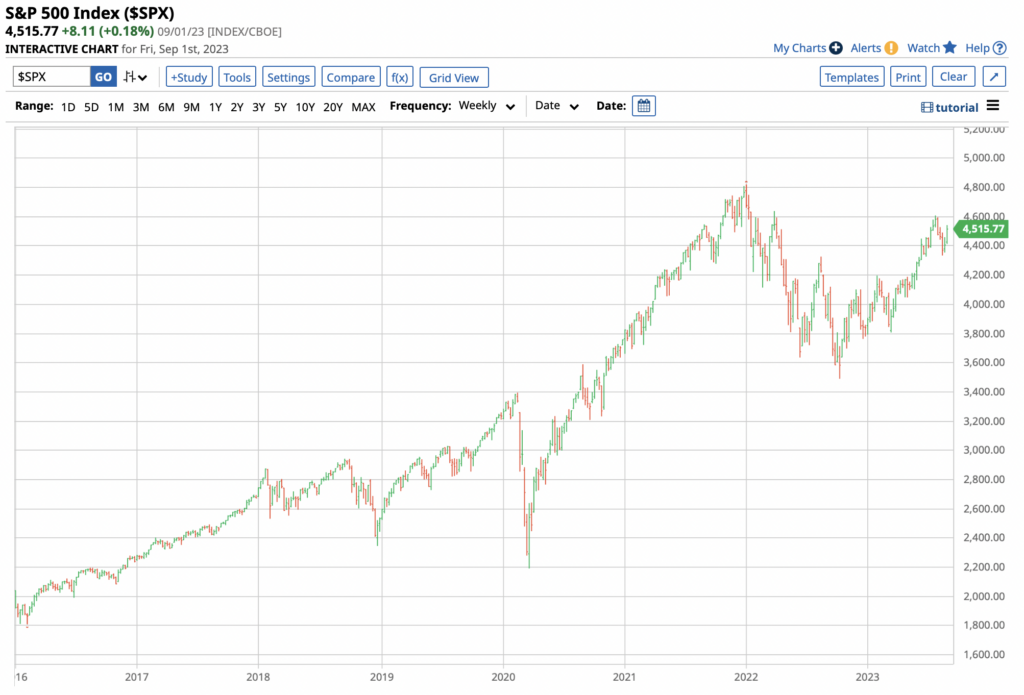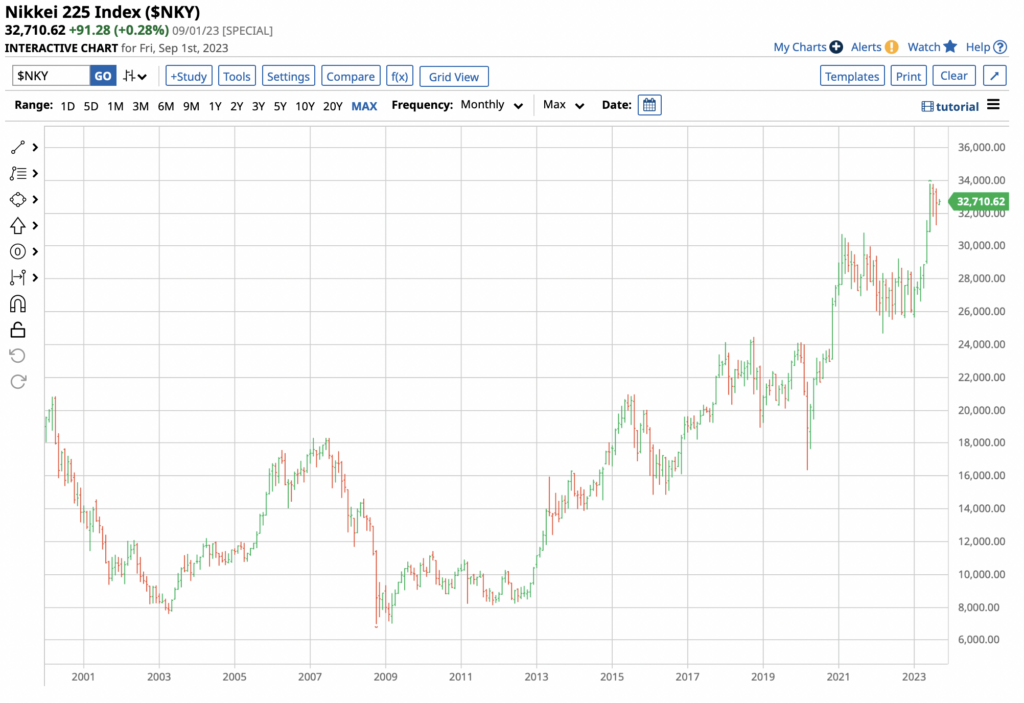To trade indices you need an index broker like IG, Saxo Markets or Interactive Brokers that can give you access to indices through OTC products like CFDs or on exchange future and options. Index trading is speculating on stock market indices like the FTSE 100, S&P 500, DAX, IBEX and the CAC. Indices trading is one of the most popular types of day trading around the world. In this guide we explain how to trade indices and what to watch out for.
Follow these steps if you want to trade indices
- Open an account with an indices trading platform (IG is good for spread betting, CMC Markets for CFDs and Saxo Markets for futures and options).
- Choose how you want to trade indices (spread betting is tax-free profits, and futures and options give you direct market access.
- Deposit funds into your brokerage account
- Select your indices by searching for their code (FTSE 100 is UKX, S&P500 is US500 and so on)
- Execute a trade and speculate on if it will go up or down and buy (go long) or sell (go short).
Different ways to trade indices
If you want to speculate on indices (with leverage), here are the three most popular ways:
Futures contracts
Futures index derivative contracts are popular among traders. These contracts are flexible to incorporate many features including leverage and minimal tracking error. You can trade with direct market access on exchanges like ICE, NYSE, NASDAQ and CBOE. A few indices have ‘mini futures’ (such as mini Dax or mini S&P 500) to cater for traders with a small account. Bear in mind futures (trading through futures brokers) are a professional trading product and only available to clients that have sufficient experience and funds. For traders that do not qualify for a professional trading account liquidity issues are basically moot as traders that do not qualify as professional should not really be trading in the volumes and size that would require additional margin.
Spread betting
Place bets on a £ per point basis as to whether you think the price will move up or down. There is no capital gains tax on profits as trades are structured as bets. The costs to spread betting are the spreads to open and close positions. Most brokers offer competitive pricing on equity indices. For example here with IG, spreads on the FTSE are 1 point, 2.4 on the Dow and 0.6 on the S&P.
CFDs (Contracts for Difference)
You speculate on the opening and closing price of your chosen equity index. This is a form of leveraged trading. CFDs are popular for index trading outside of the UK where financial spread betting is not available.
Industry experts told us
"Index trading provides an excellent way to speculate or hedge on the overall performance of the largest listed companies within a regional economy like the FTSE for the UK or the S&P500 in the US. Another particularly useful aspect is being able to trade one indices' performance against another which can protect you from dramatic overall market moves."Cost of trading indices
There are two types of spreads on index trading. Fixed and variable.
Fixed means that the difference between the buy and sell price will always be the same. For example, the spreads on Wall Street at always 1 point, the DAX is 1 point and the S&P is 3 points.
Variable spreads mean that the difference between the buy and sell price will change depending on how liquid and volatile the market is. For example, around non-farm payrolls, the market will be more volatile and the best bid offer prices will not have as much liquidity. Therefore, the prices will be slightly further apart.
- Related guide: 50 rules for successful trading
For example here with IG, spreads on the FTSE are 1 point, 2.4 on the Dow and 0.6 on the S&P.
It’s a bit, swings and roundabouts really. You know where you are with fixed spreads, but with variable, during normal market trading you can get tighter prices, but they widen as the underlying market widens.
Most brokers offer competitive pricing on Index trading. But if you want to compare the most up to date pricing, go to our index broker comparison tables to compare spreads.
Spread betting and CFD trading on the major indices is risky.
Leveraged index trading
A quick note about the above trading methods. These vehicles can be risky because they have embedded leverage. This means that you can lose capital far more than anticipated on a ‘bad’ day – a session where prices move sharply against your positions. In other words, the trading account has to have sufficient capital buffer to withstand these fluctuations.
The second point concerns the spread between the buy and sell prices. When a market becomes extremely volatile, spreads will increase (sometimes dramatically) as brokers, market makers and large investors all want to dump large positions simultaneously. Prices may leap or plunge in seconds.
For example, around US non-farm payrolls, the market will be more volatile and the best bid offer prices will not have as much liquidity. Therefore, the prices will be further apart.
Volatile pricing may hit the stops (always have them when opening positions) and then prices bounce back near the starting points.
Lastly, if at any point you find that these leverage trading is not working and is depleting your capital at a high rate, switch to investing as leverage is much lower. There are many equity-based ETFs that you can buy and hold in your portfolio. This provides an equivalent exposure (since both instruments are based on the same underlying equity index) but with easier-to-manage portfolio risk.
Second only to forex trading, indices offer good liquidity, a decent intra-day range and pretty much 24 hour news flow.
SPDR iShares 500 (SPY), for example, is the largest ETF in the world that tracks the S&P 500 index. You can buy this ETF for your stock portfolio.
Why are indices so popular in trading?
Major indices are also some of the most liquid tradable assets out there so no matter how big a trader you are your orders should always get filled.
As index trading is heavily influenced by a combination of the individual constituents of an index, overall economic data and self-fulfilling technical analysis there is a never ending supply of news, events and signals to trade from.
Traders analyse and develop judgements on major stock market indices like the FTSE 100, S&P 500, DAX, or the Nikkei 225. Then, active bets are placed on the direction of the index. But who trades equity indices? Institutional portfolio managers, traders and investors all trade equity indices in major financial markets. Liquidity is excellent; exposure easily adjustable. Leverage is attainable via futures. Their trading time frames may range from intraday to multi-month. In sum, index trading is no more sophisticated than Forex trading as long as you understand the basics and master the rhythm of the market.
The rest of this guide helps you to understand these indices, what they are and how to trade them.
How does trading an index work?
An equity index is basically an artificial financial construct whose value is derived from a fixed number of stock prices. Of course, the larger the index, the more constituents it has. Investors often use these indices to describe, measure and compare the aggregate performances of a group of selected stocks.
For example, there is a stock index for the large-cap (called blue chips); and another for the mid-cap. Often, there is another for the small-cap stocks – stocks whose market capitalisations are among the smallest in a market.
A stock index, unlike a stock security, can’t be traded directly. Instead, you have to purchase a security or derivative that is based on the index, such as an ETF or index fund or futures.
Another point worth noting is that a stock index’s minute-to-minute value fluctuation relies on individual stock prices. Depending on the calculation method, a stock with a higher market capitalisation often influences the index more than a small one.
What makes equity indices popular is due to decent intra-day ranges and pretty much 24 hour news flow. The constant release of economic figures and leading indicators creates sufficient price volatility to trade in most sessions.
Major equity indices are also some of the most liquid tradable assets out there, so no matter how big a trader you are your orders should always get filled.
One of the well-known equity indices is the US S&P 500 Index, arguably the most important equity index in the world. The index encompasses many global stocks such as Apple (AAPL), Microsoft (MSFT) and Exxon (XOM).

Source: Barchart.com
Benefits of trading equity indices
Equity indices are popular trading vehicles. There are a few reasons their popularity:
- Equity indices are linked to macro cycles – since stock markets are proxies for the underlying economy. While it is true that the economy and stock market may not move together all the time, they do synchronise. During a recession, companies report losses and lower profits. This dents stock prices. Ergo, stock indices are popular instruments to trade the macro outlook.
- Equity indices provide diversification. Investors can trade equity indices across different countries. And because the underlying economies grow differently, this means their stock markets zig-zag at a different pace. This provides some diversification to a portfolio.
- Equity indices do not go bust. Unlike stocks. By and large, an equity index is made up of stronger stocks. Weaker companies are gradually deleted from the constituents list – known as ‘rebalancing’ – to maintain the vitality of the index. Yes an index may drop by two-thirds, but it will not fall to zero.
- Key equity indices are liquid. Investment and derivative instruments that based on major equity indices generally have good liquidity and easy to trade.
- Equity indices are used to hedge underlying stock exposure. Given the good liquidity portfolio managers used equity indices to hedge (albeit imperfectly) their equity exposure. Trading in most blue-chip indices are active.
Most popular types of indices trading
We’ve covered the best indices to trade in a separate guide, but here we will run through the most popular regions for index trading.
US indices
The US stock market is the largest in the world. The depth of the American capital market is unrivalled due to presence of Wall Street and numerous global-leading major technology companies (eg Apple or Tesla). Trading activities in Wall Street are hectic; liquidity is excellent. Three favourite US equity indices to trade are: S&P 500, Nasdaq and Dow.
European equity indices
Next on our list of the most popular equity Indies to trade are based in Europe. The continent is home to numerous industrial powerhouses and fashion businesses, many of which are world class, eg LVMH, BMW, and BASF. Because of this, Europe is one of the best places to invest and trade. Since not all European financial markets offer similar depth of liquidity, traders look to larger ones, such as DAX and CAC.
Asia Equity Indices
Asia includes a huge swath of the world’s population. Many Asian countries are still developing. This means that the continent houses a large number of fast-growing companies. This excites many investors since returns are potentially massive. As an example, look no further than VinFast – a 6-year old Vietnamese EV maker that, after its 2023 IPO, was briefly worth 3x Volkswagen’s market cap.

Apart from Japan and HK, there are a few Asian indices that foreign investors preferred to trade, including India’s Sensex Index, Singapore’s Straits Times Index Index, Korea’s KOSPI Index, and the Australia’s S&P/ASX200 Index. Many of these indices are heavily skewed toward certain sectors. For example, the Aussie index contains plenty of mining and natural resource stocks due to the richness of natural minerals in the country.
What moves index prices?
Knowing these indices is only the first step towards profitable trading. Calculations aside, the most important things to know about these stock indices are:
- Index Methodology and Constituents Makeup. How are the indices calculated? Some are market-weighted; some are price-weighted (eg Dow). Within the constituent list, what companies are the largest? One general rule of thumb is this: The bigger the company, the more influence it will have on the index. This influence is especially large if the index has less than 50 components.
- Sector Representation. Some indices are heavily skewed towards certain sectors. This means that the rise and fall of that particular industry may result in the movement of the aggregate index.
- Index Historical Movements. Find out what had happened in the past. In Japan, for example, earthquakes (’95) and tsunamis can have large – but temporarily – impact on the stock market. In the US, prices can collapse 20% in a day (’87) or plunged 9% intraday (2010). When an equity index suffered from a collapse of an asset bubble, chances are prices will drop further.
- Macro Factors – such as tariffs, interest rates, unemployment, inflation can all impact the stock markets one way or another.
- Technical Trends – occasionally an index can be influenced by technical trends. For instance, when an index surged past 3,000 to record highs may lead to more momentum buying thus creating further demand. Major round number levels can sometimes act as support or resistance to a trend. A quick glance at Nasdaq Composite below shows major support at 10,000.
Where can you trade indices?
Aside from market makers that are required to create some minimum liquidity, there are no set rules for OTC brokers to provide liquidity. Liquidity is based on the underlying market as some brokers will need to hedge client index positions. If the underlying market has thin liquidity, so will your broker.
However, some brokers also limit liquidity based on position size or overall exposure. Retail trading accounts will get less OTC liquidity that professional trading accounts. Also, there will be position limits based on overall exposure. If a trading account only has one position it will be heavily exposed to that market, but if there is a diverse portfolio of positions, position limits will be higher as exposure is reduced.
To get the best liquidity for index trading you may be better of dealing through a direct market access broker that offers on-exchange futures and options execution. This way you can see the order book and get a live overview of liquidity in the market place.
However, futures (trading through futures brokers) are a professional trading product and only available to clients that have sufficient experience and funds. For traders that do not qualify for a professional trading account liquidity issues are basically moot as traders that do not qualify as professional should not really be trading in the volumes and size that would require additional margin.
A great book to get more information on this is Flash Crash, by Liam Vaughan, which tells the story of Navinder Sarao AKA the Hound of Hounslow, a futures trader on the e-mini S&P. It talks in-depth about how liquidity in the indices market work

Jackson is a core part of the editorial team at GoodMoneyGuide.com.
With over 15 years industry experience as a financial analyst, he brings a wealth of knowledge and expertise to our content and readers.
Previously Jackson was the director of Stockcube Research as Head of Investors Intelligence. This pivotal role involved providing market timing advice and research to some of the world’s largest institutions and hedge funds.
Jackson brings a huge amount of expertise in areas as diverse as global macroeconomic investment strategy, statistical backtesting, asset allocation, and cross-asset research.
Jackson has a PhD in Finance from Durham University and has authored nearly 200 articles for GoodMoneyGuide.com.



